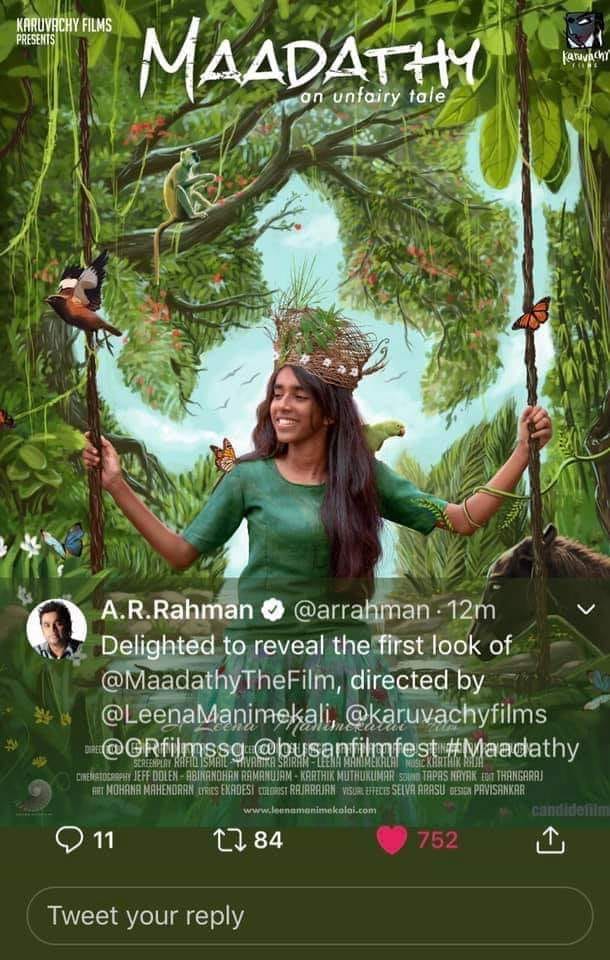KASHISH Mumbai International Queer Film Festival 2019



An artist without self-doubt is a fascist: Leena Manimekalai intv on ‘Maadathy’
In this interview with TNM, Leena talks about what went into the making of ‘Maadathy’, her journey as a person and filmmaker during the course of shooting it and more.
Independent filmmaker Leena Manimekalai’s latest feature, Maadathy – An Unfairy Tale, will premiere at South Korea’s Busan International Film Festival along with other popular entries from India like Gitanjali Rao’s Bombay Rose and Lijo Jose Pellissery’s Jallikattu.
Maadathy is a fiction-feature by the award-winning filmmaker/poet filmed over a period of time in the Western Ghats of Tamil Nadu’s Tirunelveli district. On paper, the film follows a young girl who rebels against every notion foisted upon her, based on her birth. Leena, who is excited about this 90-minute drama, is currently in Canada, working on her next titled Love Queen of Malabar, which is a screen adaptation of Canadian author Merrily Weisbord’s book on poet and memoirist Kamala Das.
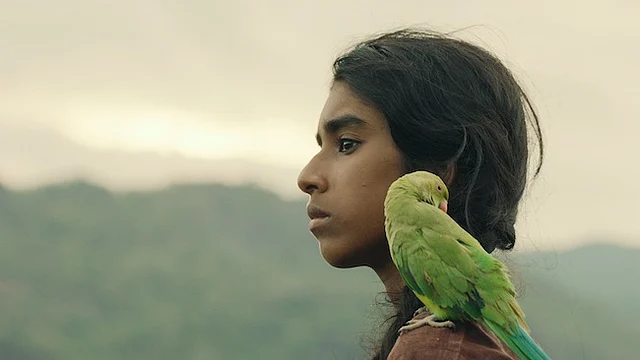
In this email interview with TNM, Leena talks about what went into the making of Maadathy and her journey as a person and a filmmaker during the course of shooting it. She also discusses the battles she fought for the sake of her film with the CBFC and against sexual harassment that’s rampant in the industry. Excerpts from the interview below.
How did Maadathy come about? How did you learn about the community and what made you decide to do a fiction-feature on it?
It all started when I came across an article that noted that it is the Puthirai Vannar community – the last in the ladder of caste system, the Dalits among Dalits, the “unseeable” – who are the ones perpetually on the move, displaced because they are unable to protect their women.
I started tracing them down and thus I landed in Tirunelveli district. Ambedkar has spoken about them in his fifth volume of writings, before independence. And it is terrible to know that their plight continues to this date. My question is how long are we going to allow this injustice to continue? This question led me to the film.
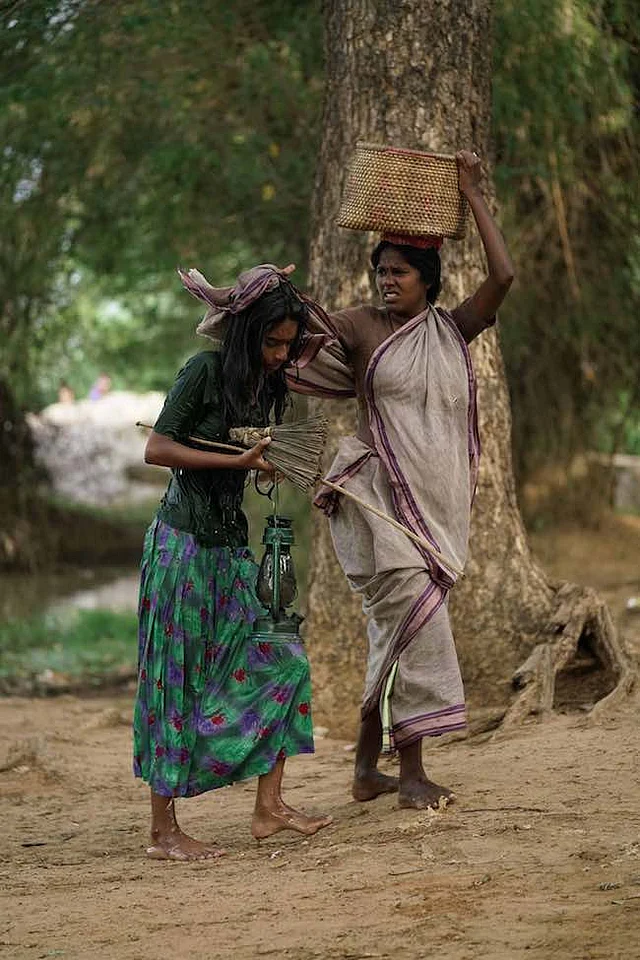
You’ve said it is people-participatory cinema. Can you share a few anecdotes on how it worked? How did the community participate?
Moorthy ayya, the first-generation graduate from the Puthirai Vannar community and his whole family adopted me as their own daughter. I stayed with them for weeks and Moorthy ayya took me to around 30 villages to meet the community, to hear their stories. Every single character in the film has been inspired by the people I met and the experiences they had shared.
I wrote the first draft and then poet Yavanika worked on more drafts and screenwriter Rafiq Ismail completed it. Rafiq, who hails from Vadakarai, close to Papanasam where I shot the film, brought the whole life and language of the soil into the script. I did multiple readings of the script with Moorthy ayya and his family and folks who are still forced into the traditional occupation of washing the clothes of the deceased and menstruating women, and incorporated their inputs.
This film wouldn’t have been possible without the community’s participation as creative collaborators, actors, production assistants, crew and our hosts. Moorthy ayya’s son worked as an assistant director and actor. His wife cooked for us. His brothers trained the actors and also played supporting roles in the film. The entire village of Anavan Kudiyiruppu became our home. I hear the people have started acting in other films too after Maadathy.
Tell us about Maadathy‘s story. Why did you choose the fiction-feature format and not a documentary?
I did do hours and hours of interviews of the Puthirai Vannar community across Tirunelveli district. What I created as fiction is from my research and reading. But I chose fiction tools to tell the story this time because legends have some kind of a mystery in them which can only be so deliciously explored cinematically. And the majestic mountains of the Western Ghats, the mystic forests, the wild streams, the seductive flora and fauna, the aroma, the magic in colours of this ecosystem for me were larger than my factual, rational understanding. I realised I cannot understand everything around me. Maadathy is the extension of my realisation.
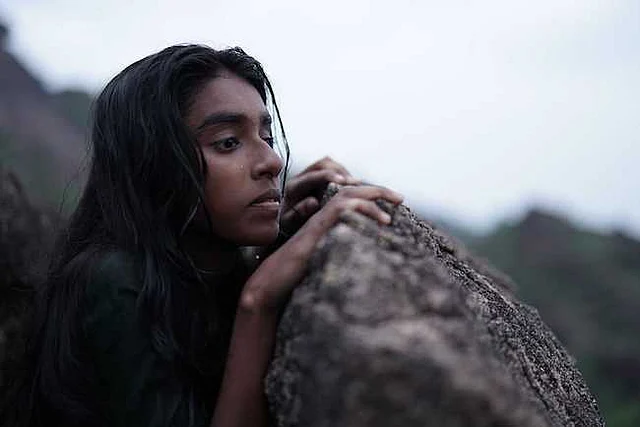
While filming Maadathy, how did you evolve as a person, as a filmmaker?
Maadathy did change me as a person. Every project does that to me, it ploughs me and makes me bear its fruits, sweet or sour. Maadathy reinforced “knowing is not singular”. It has so many layers and every time I feel I can’t know enough. I keep committing myself to the process of learning, now, today and tomorrow because that is what keeps me going.
When I was interviewing a grandmother from the Puthirai Vannar community, I asked her how she feels when she is forced to wash menstrual clothes of the oppressor-caste women. She asked me, “Don’t we wash our children’s clothes?”. That compassion and love for fellow human beings, even while being treated lower and lesser, was like a blow to my otherwise righteous mind. It was a lot of soul searching and I want to play the role of a scavenger as artist.
What were some of the challenges you faced while filming Maadathy – physical and psychological?
It was a tough location. The subject is tragic as it is about a wronged community, its women and their lives. My style is participatory and hence 90% of the actors are from the community. I dared to shoot only after days and weeks of rehearsals, script reading, dialogue training, and mock shoots. I waited every day for the community to be more kind and understanding, for the crew to stay patient, for the sun to shine not too bright, rain to shower only when necessary, donkeys to walk the shots favourably and what not. “Waiting” is “cinema” as much as “waiting” is “love”. Nobody wants to put money in a Tamil art house indie project and my resources are very very limited. It is a challenging project in every way. But I found moments in it. Moments that can change you and me and them, at least a bit.
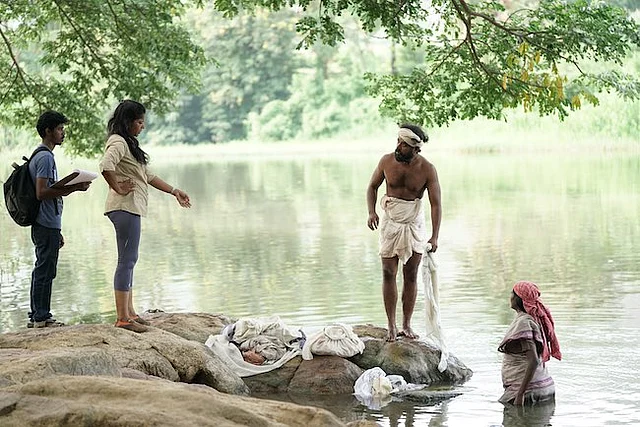
When it comes to visual arts, the gaze matters and while the story is that of an oppressed community, who is telling it matters the most. At any stage, did you receive any kind of criticism or did you experience any self-doubts about Maadathy?
An artist without self-doubt is a fascist. Doubt keeps you vulnerable and human. I know for a fact that we should know who we are before we say what we say. If you ask what my identity is, I am born a Shudra, middle-class, brown, queer woman. And my identity does define the access I am given or not given in this world and life.
Being self-aware is always a beginning for me in writing or creating cinema. Maadathy is my take on all the folktales I grew up hearing. Stories of ezhu kannimaar (seven virgins), Neeli, Isakki, Pidaari and the deities alike have fascinated me. I felt this is my history and not the ones I read in my books. Fairies are my mothers and foremothers. They are the past and the present of my existence in this world. Maadathy is one such fairy whom I have brought alive in my cinema. Why it is an unfairy tale? It is what you have to watch and know.
How did the community react to the final output?
I haven’t showed it to them yet. I am planning to release the film in local theatres and I’m sure they will be thrilled.
How do you feel about the film being chosen for screening in Busan?
Selection in Busan is such encouraging news. I have always been a student of Korean Cinema. I think the prayer of an atheist has been answered, however much an oxymoron that may be. Will be very humbled to start Maadathy’s journey with a world premiere, in October at Busan International Film Festival.
Where to next, in terms of film festivals, screenings?
There are many queued up. I really wish for Maadathy to go places as she is a free spirit now. I let her go from the warmth of my womb. She will soon walk her land too, as a proud daughter. A local theatrical release is in the cards for the near future apart from everything else.
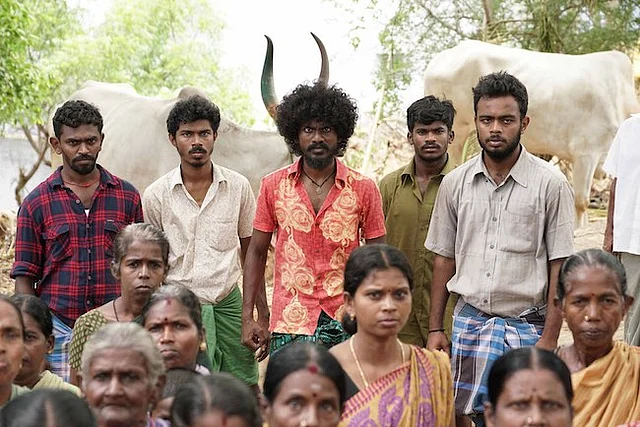
You’ve also had to deal with a court battle recently. How did that affect you and your work?
Witch-hunting, purely. But I will be haunting everyone who has chosen to stay silent now. I am one of the granddaughters of the witches nobody could burn. My work is always informed by my life and my life is always informed by my heart that is eternally yearning for something meaningful and free.
Tell us about the cast and crew of Maadathy.
Ajmina, plays Maadathy. She gave her everything to become Maadathy, the girl goddess, such profoundness in such a young age. Semmalar who plays Veni, Maadathy’s mother, is a stunning actor. I had to rewrite the scenes to give space to her dynamism. I would rate her equal to Saritha and Shobha, the two favourite Tamil female actors I adore.
Patrick plays the donkey shepherd and the whole boy gang brought lot of adolescent energy into the frames. Purushothaman, who was earlier seen in the film Madras, plays the village head and he is as natural as he is.
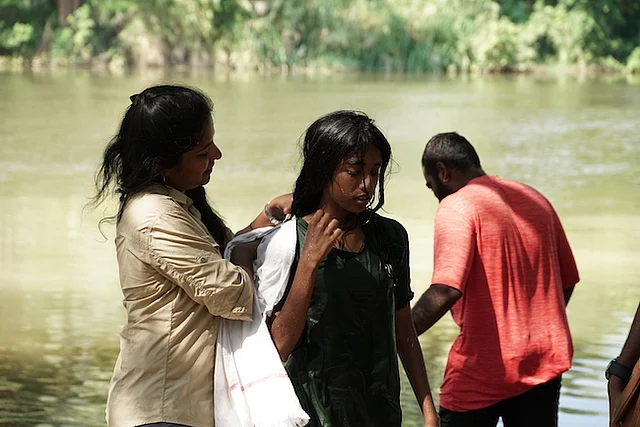
Avvaiyar Mani, our costume designer who is traditionally from the Paanar community plays the mystic man Maadan and Moorthy our mentor from the Puthirai Vannar community plays the oppressor’s role for a change.
Every scene was social sampling for me as we were reversing roles of people as actors, from their real life. My cinematographers Jeff Dolen, Abinandhan and Karthik, my art director Mohana Mahendran, my music director Karthik Raja, my sound audiographer Tapas, my colourist Raja Rajan, my editor, and executive producer Thangaraj were all fathering Maadathy with their own paternal skills, I would say. But please don’t ask how I am a single mother yet! That is how it is!!
And finally, let us talk about censorship. CBFC made several cuts to Maadathy which the Tribunal restored upon appeal. How restricting is the entire process for an independent filmmaker like yourself?
CBFC has to be brought down because of the way it functions as of now. It has to be sanitised of its job-fearing bureaucrats, of its political lackeys, of its red-tape, of its ignorance about cinema. It has to bear in mind the law of the land that protects every citizen’s freedom of expression and has to be made an independent committee that minds just the job of certifying films.
Busan International Film Festival -2019






Maadathy: Tribunal restores cuts made by CBFC Regional Officer
Bharathy Singaravel August 19, 2019
The Film Certification Appellate Tribunal (FCAT), New Delhi last week overturned the CBFC’s earlier ruling that imposed heavy cuts to Leena Manimekalai’s Tamil film Maadathy. The Regional Officer (RO) in Chennai had refused an A certificate to the film on the grounds of “Religious Contempt, Nudity, Strong Language and Portrayal of a Minor Girl in Infatuation” unless the prescribed cuts were made. Leena challenged the attempt to censor her film, citing that an A certificate would mean the film is viewed by a restricted audience, that the cuts would seriously undermine the social issues that the film tackles and the imposition on her freedom of expression.
Maadathy tells the story of Puthirai Vannart women, a dalit sub-caste. Puthirai Vannars are placed at the lowest level of the caste-hierarchy and are considered a “slave caste”. They are expected to wash menstrual clothing and those of the dead and bury bodies. They face immense oppression, even from other dalit castes who believe themselves superior – to the degree that they are told to remain “unseen”, because even looking at them is “polluting”. Women and minor girls face rampant, unchecked sexual violence. The film, through a cast of actors from the community, sheds light on these atrocities. The actors speak as they do in regular life, so the objection to “strong language” by the RO does not align with the social realities within the state of Tamil Nadu, in Leena’s view.
Speaking to the Indian Cultural Forum, Leena Manimekalai described how crippling the lack of a certificate from the CBFC is for independent filmmakers. “If you want a theatrical release or broadcast opportunities or to enter the film in festivals, the censor certificate (CC) is mandatory. Even if it is called an international film festival that takes place within the country, Indian entries must have a certificate. Especially with films like mine that have particular narrative style, we rely largely on film festivals abroad. I can apply to Cannes without the certification, but not to the Pune International Film Festival (PIFF). International Film Festival of Kerala (IFFK) does take films without the CC. There are a few other festivals that do that, but they aren’t always courageous enough to take such films.” She also added that in the case a film hasn’t been cleared by the CBFC, a festival can apply for an exemption from the Ministry of Information and Broadcasting for the sole purpose of being screened at the venue. Often it happens that this exemption is not granted if the film is political.
The need is for the CBFC to function primarily as a certification authority rather than as a censor. There are legal complexities to this and the burden of navigating through the legal waters is often on young filmmakers who operate on modest budgets. Indira Unninayar, who represented the filmmaker at the Tribunal hearing has previously guided us through these complexities, when she spoke to ICF. “The Act certainly empowers the CBFC to evaluate a film based on certain guidelines. The guidelines have some normative value which the government has placed as a benchmark for the CBFC to evaluate a film. But the purpose is not to be sitting there with the intention to chop and cut and say that I have the power to chop this thing until you make the cuts to the film” she told us.
Indira represented Leena when her debut film, Sengadal (The Dead Sea) was banned by the CBFC. Sengadal dealt with the lives of Srilankan Tamil refugees living on the border shores and the difficulties they faced due to the actions of the Tamil Nadu and Central governments. The Chennai Regional Office of the CBFC had initially refused to pass the film fearing a strain on Indo-Sri Lankan diplomatic ties. It was later cleared by the Tribunal without cuts. Unninayar has also represented Anand Pathwardhan when his film was facing censorship as well.
Going forward, Maadathy has been selected for the Busan International Film Festival this year. Leena aims for a theatrical release in some months after the film has shown at more festivals.

